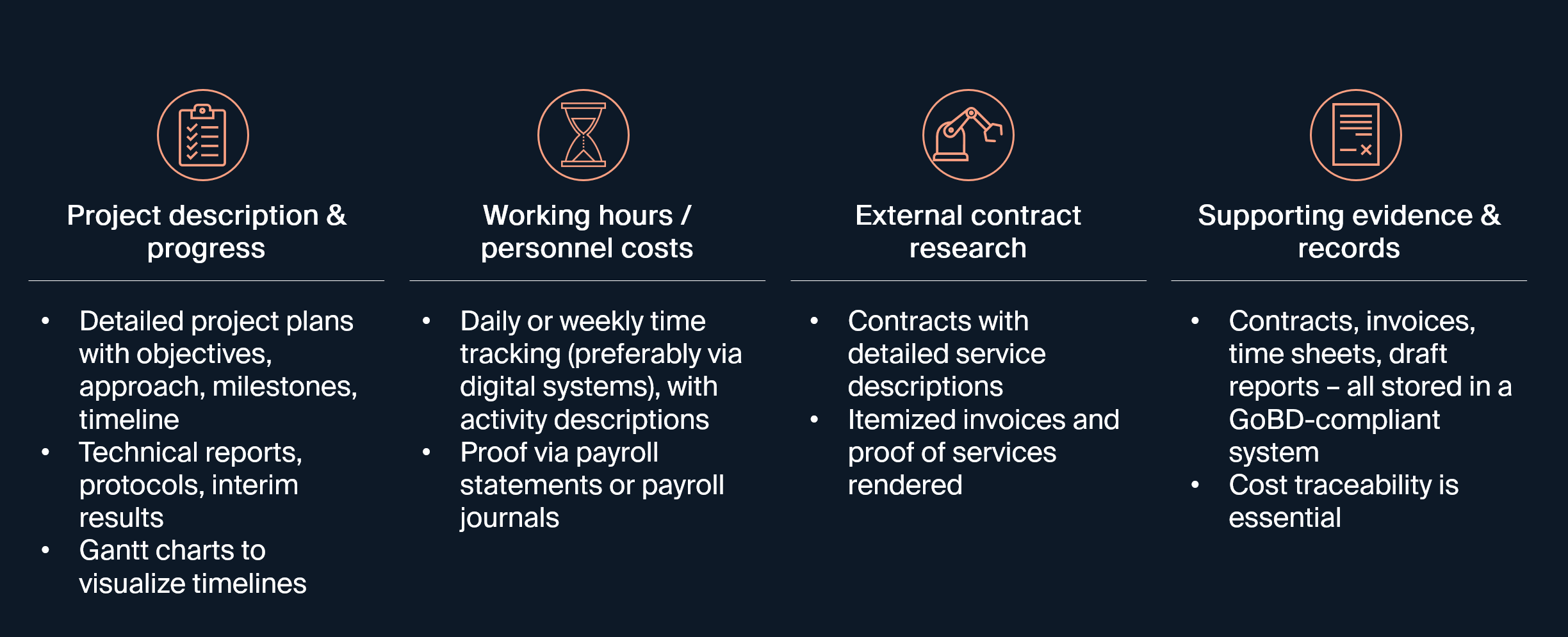Forschungszulage: Proper Documentation for the Application

Forschungszulage – Documentation Duties for Companies
The Forschungszulage is a powerful tool to promote research and development (R&D) in Germany through tax incentives. But to actually receive the funding, companies must provide complete documentation of their R&D activities and costs. Documentation is essential not only for the application to the Bescheinigungsstelle Forschungszulage (BSFZ), but also for the review by the tax office.
In this article, we explain which records are required, how they should be maintained, and which best practices have proven effective in practice.
You can find a comprehensive overview of the Forschungszulage here.
Why Documentation Matters
.png)
The Forschungszulage involves two review processes:
- Content review by the BSFZ – focus on the technical R&D character (project content, objectives, structure).
- Financial review by the tax office – focus on proper proof of expenses (hours worked, personnel costs, invoices).
In both cases: without complete and traceable documentation, the risk of delays, inquiries, or even rejection increases significantly. Proper documentation ensures transparency and accountability.
You can find more details on the eligibility criteria and the BSFZ review in this blog article.
What Needs to Be Documented?
Documentation requirements can be grouped into four main categories:

- Project description & progress
- Working hours / personnel costs
- External contract research
- Supporting evidence & records
Format of Documentation
.png)
The law does not prescribe a specific form, but documentation must be auditable, complete, and traceable at any time. Proven approaches include:
- Digital time-tracking systems
- Centralized electronic project folders
- Version-controlled documents (e.g. for reports and plans)
- Standardized templates for reports and protocols
All records must comply with the GoBD (German tax rules for proper record-keeping and electronic storage).
Requirements for Time Tracking
Since personnel costs form the main funding basis, time tracking is especially critical.
Recommendations:
- Record working hours daily or weekly, electronically or on paper
- Use existing tools if possible
- Assign project-specific booking codes
- Clearly separate R&D from non-R&D activities
- Avoid lump-sum allocations; hours must be assigned to specific projects and dates

Special Case: Contract Research
When external research partners are involved, the following documents are required:
- Contracts with clear project references
- Invoices with detailed service descriptions
- Proof that the contractor actually performed R&D activities
Review by BSFZ and Tax Office
BSFZ: Evaluates the project description and checks compliance with R&D criteria. It does not review detailed costs.
Tax office: Examines personnel costs and other claimed expenses, cross-checking with the tax return. It may request supporting evidence such as contracts, invoices, or time records.
Retention Periods
For the Forschungszulage, the general tax retention periods under the German Fiscal Code apply. Records must be kept for 4 years after the fiscal year in which the expenses arose. In practice, it is recommended to keep documentation for 6 to 10 years, as audits can still occur much later. To be on the safe side, we recommend retaining all project-related records for at least 10 years to ensure full compliance in case of later reviews.
Common Mistakes in Practice
.png)
- Missing real-time documentation – reconstructing records later is error-prone
- Unclear assignment of hours and costs to specific projects
- Lack of tamper-proofing (e.g. Excel lists without signatures are not GoBD-compliant)
- Mixing eligible and non-eligible activities without clear separation
- Missing evidence in cases of contract research
Best Practices
- Start early: set up documentation from the beginning of the project.
- Choose the right format: ERP system, Excel, or time-tracking tools – but ensure GoBD compliance.
- Use standardized templates: saves time and simplifies review.
- Assign responsibility: designate a project lead for maintaining records.
- Train employees: inform staff early about documentation requirements.
- Conduct regular internal audits: check documentation quality at least quarterly.
More Funding. Less Effort.
Accurate, audit-proof documentation is essential for a successful Forschungszulage application. It secures eligibility, minimizes the risk of rejections or clawbacks, and ensures efficiency. Companies that establish clear processes, use the right tools, and systematically prepare supporting evidence lay the foundation for smooth and secure R&D funding.
At DnA Ventures, we support you not only with the application but also with the required documentation of your projects. With proven expertise and structured processes, we ensure your Forschungszulage is approved quickly.
Curious how much funding your R&D projects could receive?
Let’s find out!
.png)
.jpeg)
.png)
.png)
